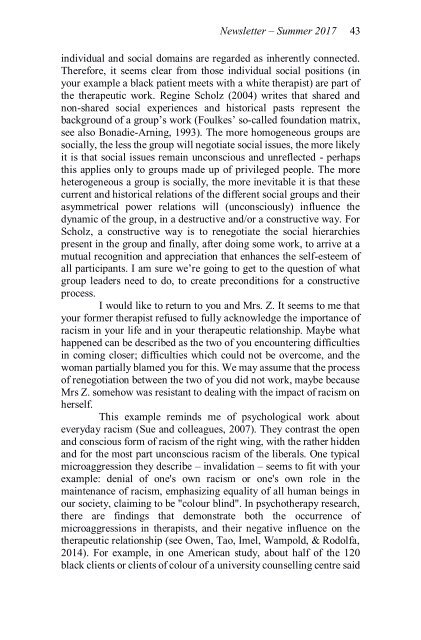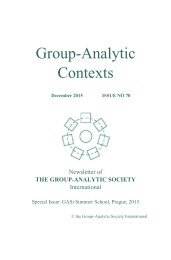Group-Analytic Contexts, Issue 76, June 2017
Special Issue: Preparing for the Berlin Symposium
Special Issue: Preparing for the Berlin Symposium
Create successful ePaper yourself
Turn your PDF publications into a flip-book with our unique Google optimized e-Paper software.
Newsletter – Summer <strong>2017</strong> 43<br />
individual and social domains are regarded as inherently connected.<br />
Therefore, it seems clear from those individual social positions (in<br />
your example a black patient meets with a white therapist) are part of<br />
the therapeutic work. Regine Scholz (2004) writes that shared and<br />
non-shared social experiences and historical pasts represent the<br />
background of a group’s work (Foulkes’ so-called foundation matrix,<br />
see also Bonadie-Arning, 1993). The more homogeneous groups are<br />
socially, the less the group will negotiate social issues, the more likely<br />
it is that social issues remain unconscious and unreflected - perhaps<br />
this applies only to groups made up of privileged people. The more<br />
heterogeneous a group is socially, the more inevitable it is that these<br />
current and historical relations of the different social groups and their<br />
asymmetrical power relations will (unconsciously) influence the<br />
dynamic of the group, in a destructive and/or a constructive way. For<br />
Scholz, a constructive way is to renegotiate the social hierarchies<br />
present in the group and finally, after doing some work, to arrive at a<br />
mutual recognition and appreciation that enhances the self-esteem of<br />
all participants. I am sure we’re going to get to the question of what<br />
group leaders need to do, to create preconditions for a constructive<br />
process.<br />
I would like to return to you and Mrs. Z. It seems to me that<br />
your former therapist refused to fully acknowledge the importance of<br />
racism in your life and in your therapeutic relationship. Maybe what<br />
happened can be described as the two of you encountering difficulties<br />
in coming closer; difficulties which could not be overcome, and the<br />
woman partially blamed you for this. We may assume that the process<br />
of renegotiation between the two of you did not work, maybe because<br />
Mrs Z. somehow was resistant to dealing with the impact of racism on<br />
herself.<br />
This example reminds me of psychological work about<br />
everyday racism (Sue and colleagues, 2007). They contrast the open<br />
and conscious form of racism of the right wing, with the rather hidden<br />
and for the most part unconscious racism of the liberals. One typical<br />
microaggression they describe – invalidation – seems to fit with your<br />
example: denial of one's own racism or one's own role in the<br />
maintenance of racism, emphasizing equality of all human beings in<br />
our society, claiming to be "colour blind". In psychotherapy research,<br />
there are findings that demonstrate both the occurrence of<br />
microaggressions in therapists, and their negative influence on the<br />
therapeutic relationship (see Owen, Tao, Imel, Wampold, & Rodolfa,<br />
2014). For example, in one American study, about half of the 120<br />
black clients or clients of colour of a university counselling centre said













